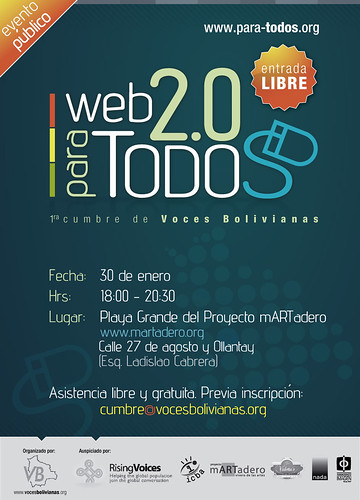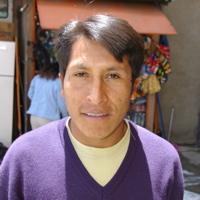Blogger Virginio Sandy arrived in La Paz for the 2nd annual national Bolivian bloggers conference. Mr. Sandy is an indigenous “authority” of his ayllu, who is selected on a rotating basis to be a leader of his community. During his presentation on the panel of Digital Literacy, he explained how his community lacks electricity, much less internet. However, he conveyed the importance of maintaining his blog, as it has become a two-way window to the rest of the world. At the conference, he joined 10 of his fellow Voces Bolivianas participants, who came from El Alto, rural communities on the Altiplano, and Santa Cruz. These participants made up a large percentage of those in attendance, and achieved that the gathering was much more representative in nature.
The new bloggers, members of the Voces Bolivianas team, and bloggers at large all interacted in person, and regardless of ethnicity, geography or social class and in essence, what the project is all about. Success can be measured in the number of blogs created, as well as the number of posts written, but narratives such as seeing real relationships built has shown that Voces Bolivianas has accomplished some of its mission.
With the Public Conference held on August 29, which drew 83 attendees and the Barcamp, where 16 bloggers showcased their projects and ideas, Voces Bolivianas completed its first year. What had started in September 2007 as a one-time workshop for 23 residents of El Alto expanded due to necessity, interest, and the commitment of all those who have taken part. Even though there is much to improve upon, there is definite interest in continuing through 2009. Some of the highlights of 2007-2008 include:
Accomplishments
* The completion of three multi-month projects – El Alto I, El Alto II, and Santa Cruz I
* Bolivian Voices Day on April 19 with the help of many national bloggers in 9 sites in 6 cities.
* Travel scholarships offered to attend the 1st and 2nd Bloggers Conferences
* Additional workshops in Achacahi, Trinidad and Sucre (workshops have reached 6 of the 9 country's department)
* Translation of content to English and the indigenous language of Aymara
* Presentations at We Media in Miami and the Global Voices Summit in Budapest
* Participants acted as guide for foreign journalists
Laptop Cover Fundraiser
* Public Conference and Barcamp/Fair in El Alto
* Media Coverage in national newspapers, La Nación of Argentina, BBC World, and the Organization for American States Magazine
Even though there is much to celebrate, the team knows that there is much to improve upon and much yet to be accomplished. Over an organizational team luncheon, there were discussions about the direction, especially for the rest of the calendar year. Much of this will be a prelude to the Voces Bolivianas summit, which will be held in December in the city of Cochabamba, where much of the future of Voces Bolivianas will be decided involving many of the stakeholders that have participated in this process.
Strengths
Much of the success of the project is due to the commitment and passion of team members who believe in the mission of spreading the use of citizen media to underrepresented groups. Even though the initial grant money from Rising Voices completed in March, team members continued with tasks and iniatives in their free time. In addition, many more bloggers and supporters of the project have joined the cause and have volunteered their time, for example, on Bolivian Voices Day, where 19 bloggers took part in the implementing the training sessions. This support nationally from bloggers is essential, and includes many reading the new blogs. Interest from potential students, organizations and institutions is high and there is a waiting list to take part in future actitvities.
Weaknesses
The Bolivian blog community Blogs Bolivia [es] noted that a small number of original workshop attendees have continued writing in their blogs. One can point to the lack of access, lack of time, and lack of habit of writing. This carries over to the workshops,where Voces Bolivianas must rely on public, costly and unreliable internet cafes for workshops. Another weakness is an informing, yet evolving teaching curriculum, which is not consistent. Students have asked for manuals, yet a definitive and all-encompassing manual has yet to be developed. Finally, even though there is a lot of commitment by the team, each has their own jobs, other projects and other responsabilities that often have to come before the tasks of Voces Bolivianas. A lack of legal standing is an obstacle to receiving larger amounts of funding.
Opportunities
Due to the high interest, the organization can be choose more carefully with which groups and organizations to work. High visibility nationally also attracts potential trainers and the ability to expand to new regions of the country. Due to the multi-talented potential of the team, there is an opportunity to branch out to other areas, such as citizen journalism, web entrepreneurship, and other media projects. The interest and support internationally has yet to be tapped to its full potential.
Threats
An informal adminstrative structure can leave the organization open to skepticism by outside observers, which would overshadow the work of Voces Bolivianas. In addition, there is also the possibility of trying to expand for the sake of expanding and spreading the team too thin. Having a part-time coordinating team can often leave tasks unfinished due to lack of time.




